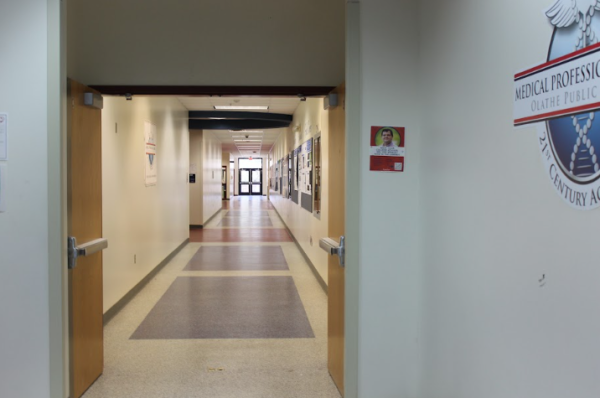Compelled to Cheat
We have all witnessed it. Some of us have even done it firsthand. Wandering eyes, questions that shouldn’t be asked and answers you should never have. One choice can land a student in the principal’s office. But when a student has been pressured to have a dazzling report card of A’s in AP and other honors classes, cheating becomes their only option. Or so they think.
Before the age of AP classes reigned, cheating in school was not unheard of, yet still uncommon. But now, as rigorous classes push students more today than any high school class has in the past, students have been turning to other methods of getting their coveted A. Not studying. Not doing homework. Cheating.
A recent poll of 14 to 18 year olds revealed that 29% of students use some kind of technology to cheat during a test. Almost a third have witnessed their peers cheating. But cheating in school wasn’t bred in high school, in fact, 30% of the polled students admit to cheating before high school.
Today, many students enrolled in rigorous classes have the mentality that their only option is to get into a good college, and that means their application must be flawless all the way down to their straight A transcript chock-full of upper level classes. Then, as the homework in these classes piles up, students feel like they are drowning. Four homework assignments due tomorrow followed by two tests the next day and three more the next week. Stress, anxiety, nerves going off the rails and pressure pushing them harder than they’ve ever experienced.
Maybe some students run out of time and cheating by copying their friend’s homework the hour before it’s due is the only way they can get it done. Maybe a student had to work late the night before a big test and didn’t get any studying in. But because they copied the last three homework assignments, they haven’t learned anything. Why take the risk of failing a test you never studied for when you can phone a friend? Whether that friend is a phone or a person that has already taken the test, desperation overrides morals and the fear of consequences.
But lines get blurred over the true definition of cheating. According to the Olathe School District Student Code of Conduct, cheating is defined by “Plagiarism, cheating on tests, copying assignments or papers, [or] placing parent/teacher signature on document.”
Olathe North Senior Nathan Laughlin, taking three AP classes, defines cheating as “Using resources that the instructor hasn’t allowed you to use.”
The pressure of upper level classes has pushed students to cheat in high school more than ever before. “I know that there’s a ton of pressure to cheat, but it has never felt worth it to me.” explains Olathe North Senior Nicholas Gerhold who takes four AP classes. “[Students] just feel tons of pressure from possibly family or just everything else to do well in the class.”
Laughlin comments on how he feels the pressure Gerhold explained. “I didn’t prepare myself enough to pass the test.” he describes.
An anonymous Olathe North student taking five AP classes describes the mentality of high school students, stating, “AP students are expected to succeed and accomplish more. They cheat to keep up with this stereotype and avoid having to struggle; they’re so unused to failure and struggling.”
Olathe North Junior Johanna Hines, taking four AP classes, describes how students do not have enough hours in the day to keep up with their rigorous work load. “You could do your own work and do well but sometimes it helps because we have hours of homework and have sports.”
“I will admit I have cheated before on busy work or weekly assignments.” explains the student. Instead of turning in an incomplete or late assignment, they turned to cheating.
Similarly, Hines divulges her experiences with cheating. “If it’s homework, I would give someone the homework. If they are asking, it’s messing with their learning potential, but I won’t say no if they need help on homework.”
Students enrolled in AP and honors classes feel the most pressure when it comes to tests and especially finals. Studying becomes senseless when students cannot grasp a concept or they run out of time. Even if they were semi confident in their understanding of the material, cheating becomes a safeguard, guaranteeing an A.
The anonymous student discloses, “I have heard of kids who have cheated on tests and finals; they’d sit together and go number by number, having signs for A, B, C, etc., such as tapping a pencil, and they went through the entire final like that.”
With cheating evolving with the dawn of technology in the form of smart phones and students creating elaborate systems to communicate during tests, teachers have had to adapt their methods of teaching and testing. Olathe North biology teacher James Sturgeon explains how he prints different versions of each test and separates students so they cannot sit next to each other while taking a test.
Even with his efforts to prevent cheating in his classroom, Sturgeon expresses, “With technology these days, it’s almost impossible to keep up with the possibilities of cheating.”
Sturgeon goes on to point the finger at technology. He describes how easily students can take pictures of assignments, quizzes and tests with a phone. Since apple watches hit the market, students can now look up answers more stealthily by pretending to adjust their watch than getting out their phone. Students can listen to audio recordings by pretending to listen to music.
“Everyone is connected with technology.” Hines expresses, giving a student perspective on cheating with technology.
Many believe that cheating is senseless, such as Sturgeon, who explains “[Students] aren’t cheating me, they are cheating themselves out of their own education.”
Sturgeon goes on to describe the motive of a student who cheats, “They aren’t as anxious about what they’re learning; they are worried about the pressures of getting good grades.”
History teacher Abby Shopper explains her opinion on why students cheat. “I believe it’s easier to learn the material but they think it’s easier to cheat. They may be taking many AP classes so they think they need to cheat to get by.”
“A lot of AP students have pressures put on them to perform and when they don’t get a good score it’s like a failure to them so they take the easy way out.” Hines explains.
Sophomore English teacher Gwendolyn Jacobs expresses the pressures honors students feel. “The demand on students to be successful are higher than it was in the past. As a result, students are having to come up with creative ways to be successful.”
Again, the motive to cheat surfaces: pressure. To get good grades, to rise in a class rank, to compose a flawless college application, to get into a prestigious college. Cheating almost always boils down to the pressure.
The anonymous student lastly comments, “Cheating is not required to succeed in AP classes, it just takes hard work and time management.”

Number of years on the paper: This is Isabella's third year on the paper
Grade Level: 12th grade, senior
Favorite part of Newspaper: "Seeing the...

Number of years on the paper: This is Abigail's fourth year on the paper
Grade Level: 12th grade, Senior
Favorite part of Newspaper: "Getting to...





